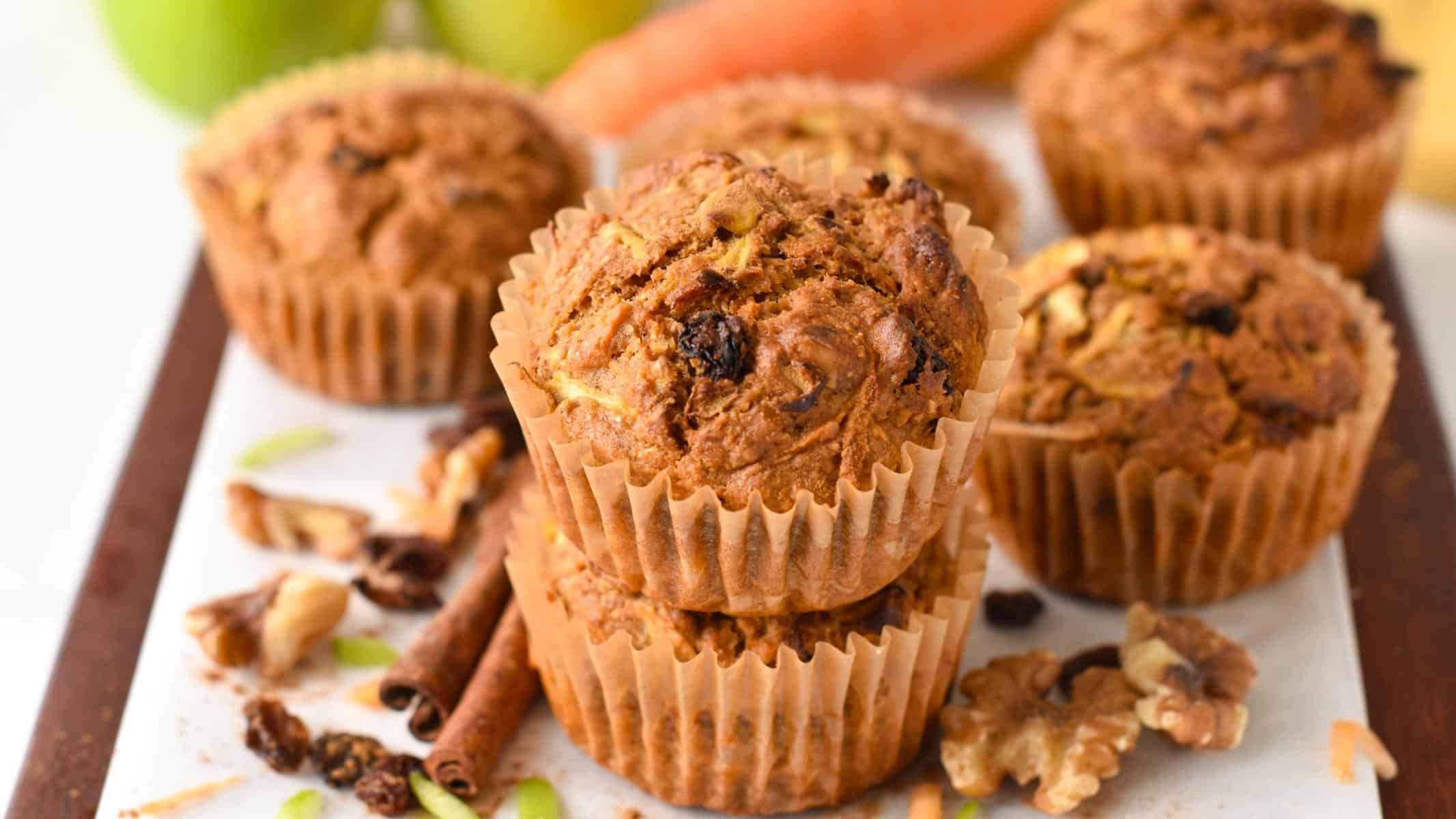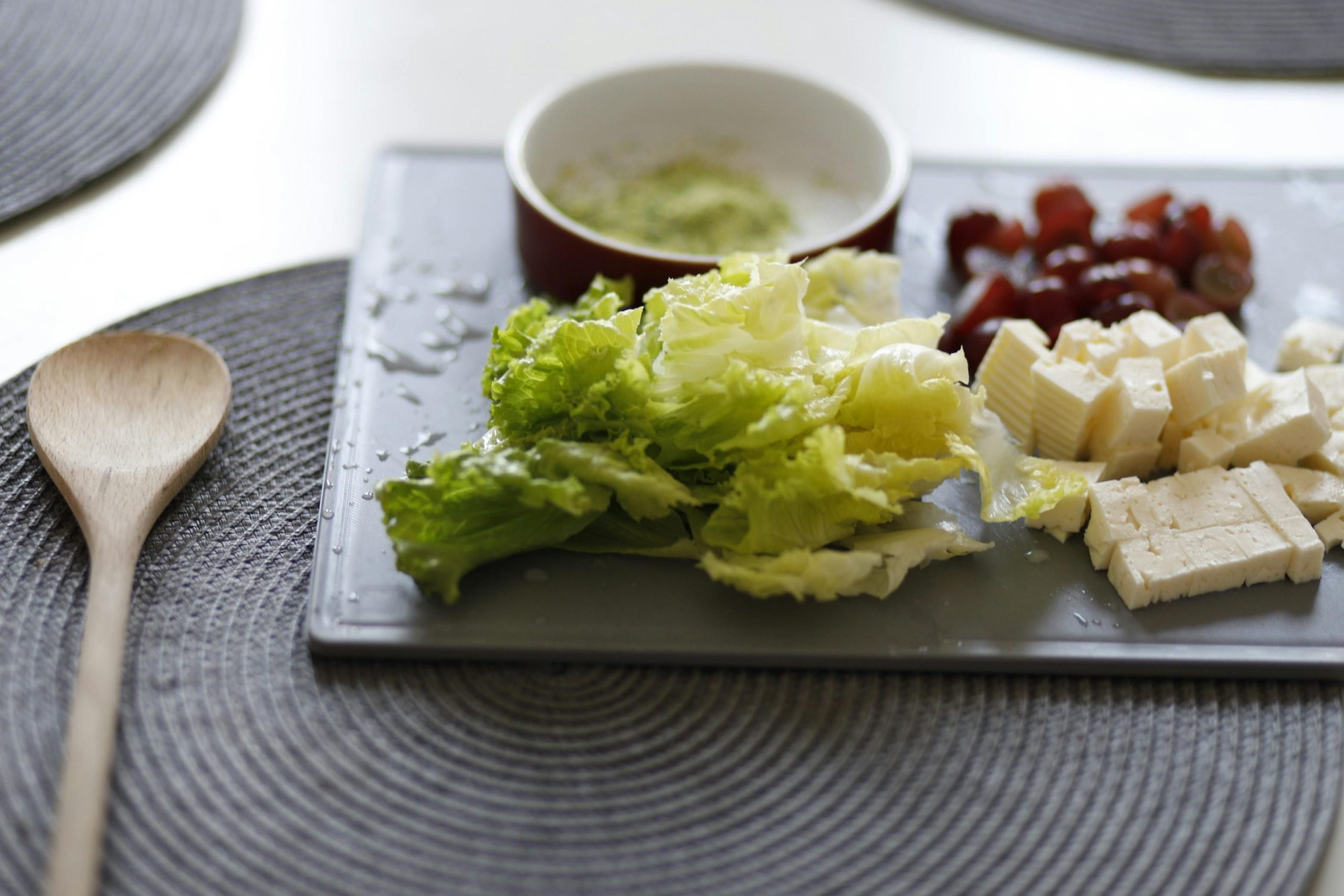Imagine starting your day with a warm, freshly-baked vegan muffin—sounds delightful, doesn’t it?
Finding a tasty yet healthy breakfast option can be challenging, especially if you’re adhering to a vegan diet.
Vegan breakfast muffins are a perfect solution, packed with wholesome ingredients like muesli, pecans, and plant-based milk, ensuring a nutritious start to your day.
In this guide, we’ll explore everything from essential ingredients and preparation tips to creative variations and health benefits, making your mornings both healthy and delicious.
Essential Ingredients for Vegan Breakfast Muffins

Crafting delicious vegan breakfast muffins starts with selecting the right ingredients. Essential components like all-purpose flour and baking powder provide the base and leavening needed for fluffy muffins. For those new to vegan baking, it’s crucial to understand the role of each ingredient and how they interact to create the perfect breakfast treat.
In vegan baking, traditional dairy and egg products are replaced with plant-based alternatives. Plant-based milks such as almond, soy, or oat milk are excellent for adding moisture, while oils or vegan butter ensure your muffins are tender and rich. These ingredients are not only crucial for the texture but also contribute to the overall flavour of the muffins.
Sweeteners and flavour enhancers are also vital. Natural sweeteners like maple syrup or coconut sugar can offer a depth of flavour, while spices such as cinnamon or vanilla extract add a delightful aroma. Together, these ingredients combine to create delicious vegan muffins that are perfect for a healthy and satisfying vegan breakfast.
Plant-Based Egg Substitutes for Fluffy Muffins

One popular plant-based substitute for eggs in vegan muffin recipes is the flax egg, made by mixing ground flaxseed with water. This mixture gels up and mimics the binding properties of eggs, ensuring your muffins don’t crumble apart. Flax eggs not only keep your muffins together but also add a slight nuttiness that enhances the flavour.
Another excellent egg alternative is unsweetened applesauce. It adds moisture and a subtle sweetness, making it perfect for fruit-flavoured muffins. For those looking for a lighter texture, aquafaba—the liquid from canned chickpeas—can be whipped and used. It’s especially great for creating a fluffy, airy structure in your vegan muffins.
Choosing Healthy Sugar Alternatives in Muffins

When it comes to sweetening vegan muffins, there are several health-conscious alternatives to refined sugar. Maple syrup and coconut sugar are fantastic natural sweeteners that provide a rich flavour without spiking blood sugar levels dramatically. They integrate seamlessly into muffin recipes, offering a caramel-like depth to the overall taste.
For those who prefer a less pronounced sweetness, dates can be pureed and used in the batter. This not only sweetens the muffins but also adds moisture, making them soft and chewy. Bananas are another wholesome option, lending a natural sweetness and contributing to the structural integrity of the muffins.
Making Your Vegan Muffins Gluten-Free
Creating gluten-free vegan muffins can be as simple as substituting all-purpose flour with a gluten-free flour blend. These blends often combine rice flour, potato starch, and xanthan gum to mimic the properties of traditional flour, ensuring your muffins don’t miss out on texture or flavour.
For those who enjoy experimenting, oat flour or almond flour can be used in combination with a binding agent like xanthan gum to achieve the desired consistency. It’s important to adjust the liquid ratios slightly, as gluten-free flours tend to absorb more moisture than their gluten-containing counterparts.
How to Prepare Perfect Vegan Breakfast Muffins
Preparing the perfect vegan breakfast muffins begins with gathering all your ingredients. Start by preheating your oven to the appropriate temperature, usually around 180°C (350°F). Next, line your muffin pan with muffin liners to prevent sticking and ensure easy removal after baking. It’s essential to have both your wet and dry ingredients measured and ready. Common dry ingredients include flour, baking powder, and spices, while wet ingredients might consist of plant-based milk like almond or soy milk, and a vegan egg substitute such as a flax egg.
In a large mixing bowl, whisk together all your dry ingredients to ensure they are well combined and free from lumps. This mixture typically includes:
- Flour
- Baking powder
- Salt
- Spices (like cinnamon or nutmeg)
Creating a well in the center of these dry ingredients is crucial for the next step. In another bowl, mix your wet ingredients, which might include plant-based milk, a flax egg, and perhaps some vanilla extract for flavour. Pour the wet mixture into the well of the dry ingredients, gently folding them together until just combined. Be careful not to overmix, as this can lead to dense muffins.
Finally, it’s time to fill the muffin cups and bake. Spoon the muffin batter into the prepared muffin pan, filling each cup about three-quarters full to allow room for rising. Bake in the preheated oven for about 20-25 minutes. You can check if they are done by inserting a toothpick into the center of a muffin; it should come out clean. Once baked, remove the muffins from the oven and allow them to cool in the pan for a few minutes before transferring them to a wire rack to cool completely. Enjoy your delicious, homemade vegan breakfast muffins as a delightful start to your day!
Creative Recipe Variations for Vegan Muffins
Exploring creative recipe variations for vegan muffins can transform your breakfast into an exciting culinary adventure. Start with the basic vegan muffin recipe and consider adding unique combinations of flavours and ingredients. For a savoury twist, why not try mushroom and thyme, which pairs wonderfully with a sprinkle of vegan cheese? Alternatively, sundried tomato and basil can evoke a taste of summer in your morning meal.
For those who prefer a hint of sweetness in their muffins, there are numerous possibilities:
- Mix in chocolate chips or fresh blueberries for a classic flavour.
- Stir in some zucchini or mashed banana to add moisture and a nutritional boost.
- Consider adding spices like cinnamon or nutmeg to enhance the aroma and taste.
Don’t be afraid to get creative with your vegan muffin recipes. Experiment with different plant-based milks or mix in some vegan egg substitutes like flax eggs for varied textures. Each addition not only changes the flavour profile but also the nutritional content, making your vegan muffins not only delicious but also tailored to your dietary preferences.
Health Benefits of Choosing Vegan Muffins
Opting for vegan muffins can significantly enhance your diet’s health quotient. These muffins typically contain less saturated fat and no cholesterol, primarily because they lack animal-derived ingredients like butter and eggs. Instead, ingredients such as nuts, seeds, and plant-based oils provide healthy unsaturated fats. These fats are essential for lowering bad cholesterol levels and improving heart health. Additionally, the natural ingredients in vegan muffins often mean they are free from many artificial preservatives and colourings found in traditional baked goods.
Vegan muffins also boast a higher nutrient profile compared to their non-vegan counterparts. They are often rich in dietary fibre, thanks to the inclusion of whole grains, nuts, and seeds, as well as fruits like apples and bananas. This high fibre content helps in maintaining better digestive health and keeps you feeling full longer, aiding in weight management. Moreover, these muffins can be a part of a hearty vegan breakfast, providing sustained energy throughout the day. The use of whole, plant-based ingredients supports not only physical well-being but also mental health by stabilising blood sugar levels and enhancing mood.
Storing and Freezing Vegan Muffins for Freshness
To keep your vegan muffins fresh for longer, proper storage is crucial. After allowing your muffins to cool completely, place them in an airtight container. This prevents them from drying out or absorbing odours from other foods. For short-term storage, you can keep them at room temperature for up to three days. If you’re storing them in the fridge, wrap them in a paper towel before placing them in the container to absorb any excess moisture, which helps maintain their texture.
For longer preservation, freezing is an excellent option. First, flash freeze your muffins by placing them on a baking tray in the freezer until they are solid. This prevents them from sticking together. Once frozen, transfer them to a freezer-safe container or bag, ensuring they are well-sealed to avoid freezer burn. Label the container with the date, and your muffins can be enjoyed for up to three months. When you’re ready to eat them, simply thaw at room temperature or gently warm them in the microwave or oven.
Discover Vegan Delights in Zurich with Indulge
If you’re eager to discover vegan delights in Zurich, INDULGE offers an exceptional guided tour that showcases the city’s vibrant vegan cuisine. This tour is a fantastic way to explore innovative plant-based dishes and learn about their cultural significance in Zurich.
Participants in INDULGE‘s vegan tours can expect to:
- Enjoy tastings of gourmet vegan dishes from top local chefs
- Gain insights into the preparation of vegan delicacies
- Discover unique vegan-friendly eateries around Zurich
This experience not only delights the palate but also enriches your understanding of vegan culinary art.







